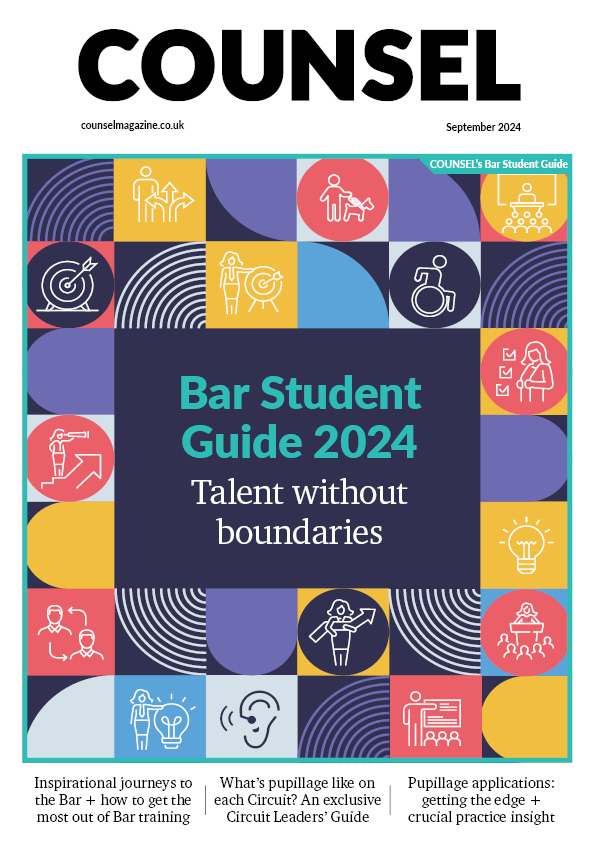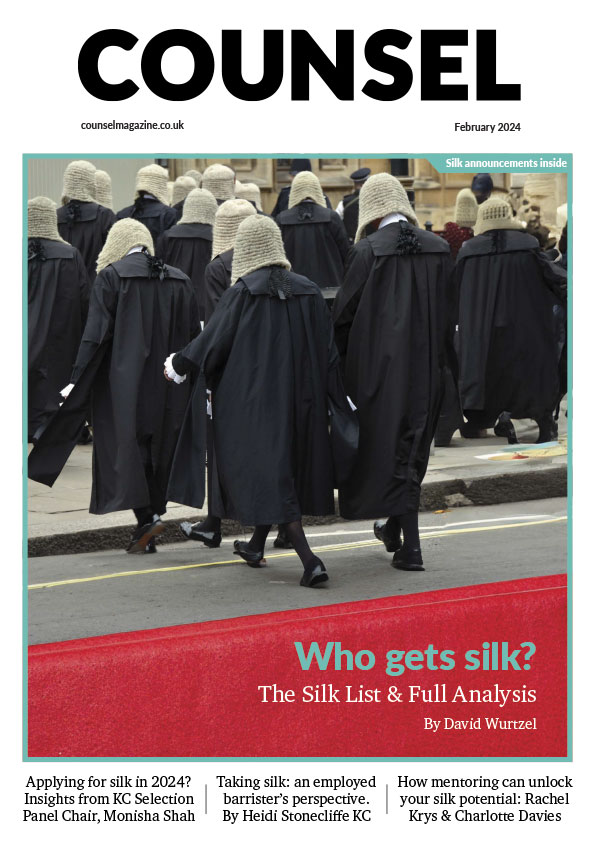Check your eligibility and the rules for the Law Reform Essay Competition
When the essay is submitted and at the date of the close of the competition, the applicant must satisfy one or more of the following criteria:
- A person who is undertaking a pupillage , as defined in the Bar Qualification Manual of the Bar Standards Board ( see Section 4A in particular ), which is registered with the Bar Standards Board. Please note: Pupils undertaking a third six pupillage or probationary tenancy (or howsoever termed) are not eligible. An applicant who met the eligibility criteria at the time of submitting their essay who commences tenancy before the deadline has closed will remain eligible to enter.
- A person who holds an offer of such a pupillage registered in the years 2024-2026 .
- is undertaking the academic component of training for the Bar . This means currently study for a degree in law or undertaking the Graduate Diploma in Law course (or other conversion course) during the academic session 2023/24, or will be doing so during the academic session 2024/25. We will accept essay entries from applicants whose academic course has started in January 2023. The academic component must be a law degree that satisfies the academic component of Bar training ( see Sections 2A and 2B of the Bar Qualification Manual ) ahead of undertaking the vocational component of training for the Bar. The applicant must also have a settled intention to become a practising member of the Bar of England and Wales; or
- is undertaking the vocational component of training for the Bar with an Authorised Education and Training Organisation (AETO) during the academic session 2023/24 or will be doing so during the academic session 2024/25; or
- is in the process of transferring to the Bar , as demonstrated by (for example) completion of, or enrolment on, the Bar Transfer Test; or
- is undertaking an integrated academic and vocational course with an AETO as recognised by the Bar Standards Board, during the academic session 2023/24, or will be doing so during the academic session 2024/25 with a settled intention to become a practising member of the Bar of England and Wales.
- A person who is actively seeking pupillage and are eligible to do pupillage having completed the vocational component (e.g. the Bar Course, the Bar/Barrister Training Course, the Bar Practice Course, the Bar Vocational Course, the Bar Vocational Studies or Bar Professional Training Course within the last five years).
On law degrees, conversion courses and Master's degrees - please note:
- Law degrees and conversion courses must comply with the Bar Standards Board's requirements .
- Master’s degrees (other than the GDL) do not automatically form part of the academic component of training for the Bar, unless combined with the academic or vocational component. Accordingly, undertaking a Master’s degree does not render a person eligible to enter.
- Subject: Essays should identify and make the case for a law reform that is desirable, practical and useful . Essays must be about a reform to English, Welsh or European law. The proposed reform presented in the essay can be legislative or a proposal to a reform to English common law.
- Format and submission: Essays should be submitted in MS Word format, in an attachment to an email to [email protected] .
- Word count and formatting: Essays must be of no more than 3,000 words, typed in Arial size 12 , with clear references and in double line spacing . The 3,000 words includes the main body of the essay but excludes the title and the footnotes, provided that the footnotes are no more than 25 words. Essays that are more than 3,000 words will not be accepted.
- Footnotes : Any individual footnotes of more than 25 words will be included in the word count.
- Annexes : Any annexes submitted will be included as part of the word count.
- References should be inserted using the Harvard style referencing system or OSCOLA Referencing System.
- Handwritten essays will not be accepted.
- Citations: A bibliography is not required, though there must be clear citation using footnotes/references. See the plagiarism section on this page.
- Essay title and applicant's name: The title of the essay must be included on the submitted essay, but the applicant’s name must not be included on the essay . The essays are kept anonymised for marking and separated from the application forms.
- Entrants must keep a record of all searches using AI tools and the text of the corresponding output. The Bar Council may carry out spot checks and require entrants, selected at random or otherwise, to produce their record. The Bar Council may also carry out any other investigation into suspected unauthorised use of AI. If appropriate, the Bar Council may refer the entrant to the Bar Standards Board, relevant higher education institution or Chambers for potential investigation and disciplinary proceedings for academic or professional misconduct.
- Other competitions: The essay must not have been submitted to this or any other essay competition in previous years. Entrants must not submit an essay which is in substance the same as one submitted in a previous year. The guidance on plagiarism is available online; any form of plagiarism will result in automatic disqualification.
- Any form of plagiarism will result in automatic disqualification . Read the full plagiarism policy for full guidance.
Reworked coursework, journals or articles: An essay may be a reworked piece of the entrant’s course work provided that it was originally the sole creation of the entrant. If an essay entry is an extension of a journal or article written by the entrant, this will only be accepted if it is originally the sole creation of the entrant and it has not been peer reviewed and edited.
- Prizes: Prizes will only be awarded when the academic section is completed and the Bar Council has received an academic reference/certificate as appropriate in accordance with the section titled ‘Supervisor approval and reference’. The Bar Council will contact the Academic/Pupil Supervisors of the prize winners to confirm that the applicant is eligible before any prize money is released to the winners.
- Supervisor approval and reference: Entries must be approved by the entrant’s Pupil Supervisor or Academic Supervisor, whose signature is to warrant that the entrant falls within the appropriate category of entrant. If the entrant is submitting an essay under (d), entrants must submit the essay with a signature from their previous Academic Supervisor or Tutor from the Bar Course. If this is not possible, the entrant should contact [email protected] with evidence that they completed the relevant Bar Course, as specified under (d), within the last 5 years with a copy of the entrant’s certificate showing completion of the course.
- The award winners grant the Bar Council the right to publish or reproduce at any time all or part of the award-winning entries.
- Entrants cannot win more than one prize in any one year. The award of all or any of the prizes lies solely within the discretion of the judges. The judges’ decision will be final.
- The deadline for the receipt of entries is 17:00 on 24 October 2024 to [email protected] . L ate entries will not be accepted. New versions of essay entries already submitted will not be accepted past the deadline.
- Entrants may complete their form by filling in the fields by hand or on a computer. If by hand, the letters must be written block capitals. The form must be signed (either by hand/electronically) by entrants and supervisors.
- Winners are entitled to refer to the achievement on their CV.
- The final decision: The decision of the Chair or a Vice-Chair of the Law Reform Committee of the Bar Council on the interpretation of these Rules will be final.
View or download the full essay rules [PDF]
Declaration of integrity
- I confirm that I have I read and understood the rules and plagiarism policy of the essay competition and fully complied with them.
- I declare that no part of my essay has been generated by artificial intelligence and that the content is entirely in my own words, save that i) AI may be used for the limited purposes of research, proof-reading and checking spelling (see Rules for further details) and ii) quotations are permitted if identified by quotation marks and referenced. I make this declaration in the context of a competition, the winner of which will receive a financial prize, and understand that my essay will be assessed on the basis that my declaration is true.
- I consent to the Bar Council copying and distributing my work in any form and using third parties to verify whether my work contains plagiarised or AI-generated material, and for quality assurance purposes.
- I confirm that I have kept a record of all searches using AI tools and the text of the corresponding output. If I am selected for a spot check, I will produce this record.
View and download the Declaration [PDF]
View and download the full plagiarism policy [PDF]
View or download the full data protection policy [PDF]

How to apply for the Law Reform Essay Competition.


Past winners
See the previous winners of the Law Reform Essay Competition.

Law Reform Essay Competition
Each year, students and pupils are invited to submit essays making the case to reform English, Welsh and European law.

Future Lawyer Blog
Kick off the year by entering an essay competition.
Tags: bar council , essay competition , law reform , prize .
Now open for 2023, the Bar Council’s Law Reform Essay Competition is aimed at developing and fostering an interest in law reform. Students and pupils are invited to submit essays making the case to reform English, Welsh and European law.
The competition is offering a top prize of £4,000 (wow!), plus prizes for runners-up and highly commended essays. Here are the details:
- The winner: £4,000, and their essay published on Counsel magazine’s website
- Runner-up: £2,500
- Best GDL entry: £1,500
- Runner-up GDL entry: £1,000
- Highly commended award: 2 x £500
In addition, all prize winners will be invited to meet members of the Law Reform Committee at a small reception held at a set of chambers.
How long have you got to craft your masterpiece? The deadline: 23rd October 5pm
If you need further inspiration, watch the video below to hear from past winners. Or read the essays from previous years (dating back to 2018).
Leave a Reply Cancel reply
Your email address will not be published. Required fields are marked *

Bar Council’s Law Reform Essay Competition 2023

The winning essay is ‘Not OK Computer: A Proposed AI Transparency Framework for the UK’ by Louis Dejeu-Castang
As the cross-sector impact of AI becomes increasingly apparent, so too does the need for its regulation. This framework seeks to unlock the transparency required to guide responsible AI development.
Louis says: ‘Having grown up witnessing the optimism about aspects of the internet gradually giving way to real fears about their detriment to society, I knew that I wanted to write a proposal concerning an area of technology regulation in its relative infancy. Artificial intelligence really seemed to burst into public discourse at the time that I was conducting my background research, which cemented my decision to write about it.’
The full essay is reproduced below.
Issue Extract

Louis Dejeu-Castang
Louis Dejeu-Castang is the winner of the Bar Council’s Law Reform Essay Competition 2023.
The winning essay is ‘Not OK Computer: A Proposed AI Transparency Framework for the UK’ by Louis Dejeu-Castang

Chair’s Column
Hope and expectation for the new legal year.
The beginning of the legal year offers the opportunity for a renewed commitment to justice and the rule of law both at home and abroad
Job of the Week

Litigator, BVI
Road Town, British Virgin Islands
Kobre & Kim is looking for a solicitor or barrister with significant Trusts and Estates litigation experience to join our BVI office.

4: Mortgages – helping you up your property ladder
By Louise Crush of Westgate Wealth Management sets out the key steps to your dream property
Representing children in the criminal courts requires specialist knowledge and skills
A centre of excellence for youth justice, the Youth Justice Legal Centre provides specialist training, an advice line and a membership programme
How to maximise your mortgage options as a barrister with fluctuating income
By Kem Kemal of Henry Dannell
SCRAM CAM®: your questions answered
By Ashley Friday of AlphaBiolabs

Henry Dannell
Providing bespoke mortgage and protection solutions for barristers
Most Viewed
Where have all the criminal barristers gone by joanna hardy-susskind.
Joanna Hardy-Susskind speaks to those walking away from the criminal Bar
Should the BSB impose a positive duty to promote diversity?
Imposing a professional obligation to act in a way that advances equality, diversity and inclusion is the wrong way to achieve this ambition, says Nick Vineall KC
May we continue to build together: Laurie-Anne Power KC
From a traumatic formative education to exceptional criminal silk – Laurie-Anne Power KC talks about her path to the Bar, pursuit of equality and speaking out against discrimination (not just during Black History Month)
Arrest warrants in the Israel-Palestine situation (2)
James Onalaja concludes his two-part opinion series
Contempt of court reform
Yasmin Ilhan explains the Law Commission’s proposals for a quicker, easier and more effective contempt of court regime

Latest Cases


The Law Reform Essay Competition: Tips and Tricks of a Recent Entrant
“I entered the 2023 competition and proposed that the powers of the coroner should be extended to grant an exclusive jurisdiction to investigate and/or hold an inquest into all stillbirths from 24 weeks. I was awarded ‘Highly Commended’ for this essay in the 2023 competition. If you are considering entering, here are a few tips that you may find helpful when drafting your essay.”
1. What is the Law Reform Essay Competition?
The Law Reform Essay Competition is an annual competition run by the Law Reform Committee of The Bar Council which is aimed at developing an interest in its entrants in law reform. Open to students, recent graduates on the path to pupillage, and future/current pupils, the competition requires entrants to produce a 3000 word essay proposing a reform to English, Welsh, and European law.
The process of researching and preparing for an entry is interesting and enjoyable. It is not a competition where you can regurgitate passages of text without thought or comment; you need to construct an argument yourself. This requires considering the current state of the law, finding areas open to challenge, and presenting your alternative in a persuasive and engaging way.
For aspiring barristers, it is an excellent opportunity to practice your written advocacy.
2. What Topic Should I Choose?
Pick a topic that you find interesting.
The process of drawing up a persuasive essay in a novel area takes time. If you read winning articles, runners up, and highly commended entries you can sense that the authors really care about the topics they have chosen and have taken the time to present something they feel proud to have written. Make sure, however, that your topic is relevant to current issues.
3. How Should I Research and Create Arguments?
You cannot grow out the branches without starting with the root.
Ask yourself basic questions about the subject area. I started by looking at the role of the coroner, what the current law relating to investigating stillbirths was, and why had the law developed in that way. This will give you a strong foundation to develop into your proposal for reform.
Follow the footnotes.
When reading a source, look at the sources that the author has used and follow those along until you have built up an arsenal of context and comment. I found that working backwards helped me find resources that defined the development of the law, spot divergences, understand logic patterns, and consequently provide even more footnotes to follow. One word of caution: if you are going to use the source, make sure that you have read it fully.
Reflect and refine your proposed arguments.
Proposing law reform, particularly if the reform has not previously been proposed, is tricky and requires dedicated thinking time to get it right. I spent a long time thinking about each argument. I considered whether there were different angles and why those angles existed. I reflected on the weight of each argument. I tweaked my arguments so that they communicate what I felt was persuasive to a reader. This was time well spent.
Let the evidence do the heavy lifting.
I found that people do not like to be told what is right and what is wrong. There is always a natural pull against agreeing with something that you are being told is the only way. Guide the reader to the natural conclusion that they have no choice but to reach on reading your presentation of the evidence.
Consider and counter the counterargument.
If you recognise a counterargument and deal with it before the reader can raise it in their mind, you can create a lot of strength in your main argument. I found this to be particularly effective when dealing with some of the ethical issues my proposal created.
4. What About the Review Stage?
There is no good drafting, only good redrafting .
Give yourself plenty of time to review your draft. My essay went through copious iterations before I got to the final finished piece. You may need to make some tough choices on what you keep in; however, the process of deciding which arguments are stronger than others is very useful when it comes to refining the final entry.
Accessibility is key.
Think about the point you are trying to make, then look at what you have written. Ask yourself whether this gets your point across. I liked to write a precis of my argument as a set of bullet points and then compare that to my draft. Often this meant I had to do some further tweaking to get the point across.
5. Why do it?
The joy of entering is not the just the possibility of a prize; it is the possibility of creating something truly original where you, as the author, are the architect of a unique and innovative proposal.
The process of preparing an entry an enjoyable, insightful, and instructive endeavour.
I hope you all enjoy preparing your entry as much as I did.
Death Row Dialogue: In Conversation with Amicus ALJ
Voices against prejudice: battling islamophobia.
Address by the Deputy Minister of Justice and Constitutional Development, the Hon John Jeffery, MP, at the Law Reform Essay Competition, hosted by the South African Law Reform Commission, held at the Southern Sun Hotel, Beatrix Street, Pretoria, 29 September 2023
Programme Directors, Justice Jody Kollapen, Chairperson of the Commission, Fellow Commissioners, Members of the Langa Family, Mr Edmund Beerwinkel and the team from Juta’s, Members of the adjudication panel, Participants in the competition and their families, Esteemed guests and friends,
It is indeed an honour to once again be part of this event.
This year’s South African Law Reform Commission Legal Essay Writing Competition in honour of the late Chief Justice Pius Langa celebrates significant milestones that are of great importance - not only to the competition itself, but also to the Law Reform Commission.
Firstly, we commemorate the 50th anniversary of the establishment of the Commission through the South African Law Reform Commission Act of 1973. This is an important milestone to recognise and to commend the legal research and law reform recommendations done by this institution over the period of half a century.
The work being done by the Commission is extremely important – it is tasked to do research with reference to all branches of the law and to make recommendations for the development, improvement, modernisation or reform thereof.
Law reform proposals should be aligned to South Africa's priorities as a developmental state and be aimed at keeping the law in sync with developments in society and in tune with the needs of South Africa's diverse population and national policy priorities.
As society and the needs and demands of society change, so should the law.
Furthermore, this year marks 20 years of the Legal Essay Writing Competition which was initially established as the Ismail Mahomed Law Reform Essay Writing Competition, in honour of the late Chief Justice and former Chairperson of the SALRC, Justice Ismail Mahomed.
Additionally, this year commemorates five years of the competition being dedicated in honour of the late Chief Justice Pius Nkonzo Langa.
The winning essays and some of the entries for this edition of the competition cover a variety of topics.
These range from the appointment of judges, setting qualification standards for the appointment of Ministers, the development of a reputative marriage doctrine to assist vulnerable parties in valid customary marriages, to decolonising the South African Constitution and legal system and to looking at the effects of unconscious bias in the justice system.
I also noticed that one of the essays focused on trademark protection and I was then immediately reminded of the words of the writer Mark Twain who once remarked on the difficulty of intellectual property law and said that the only one thing which may be impossible for God is, and I quote, “to find any sense in any copyright law on the planet.” I must confess that I agree with his sentiments.
This competition would not be possible without the support of our competition partners, Juta and Company, who are also celebrating their 70th birthday.
Their support has, and still is, instrumental in championing this event and in creating a platform to encourage students to contribute to law reform in South Africa.
Juta’s have been publishing the winning essays which gives students’ essays visibility. They have sponsored the prizes for the students and their supervisors from the respective university law faculty. They also lead in the marketing of the competition.
And, importantly, I also want to pay tribute to the late Chief Justice Pius Langa.
Pius Langa was a great man and his life is one which continues to inspire us. Born in Bushbuckridge in 1939, Pius Nkonzo Langa, the second of seven children, completed his high school education through private study and obtained the B Iuris and LL B degrees through the University of South Africa.
In 1957 he started his working life in a clothing factory in order to fund his studies, between 1960 and 1977 he served in the Department of Justice, initially as an interpreter and messenger and later as a magistrate.
He was admitted as an Advocate of the Supreme Court of South Africa in 1977, practised at the Natal Bar and attained the rank of Senior Counsel in 1994.
His practice as an advocate reflected the struggle against the apartheid system and he represented the underprivileged, the marginalised and the poor. His clients were various civic bodies, trade unions and people charged with political offences under the oppressive apartheid security legislation.
When the Constitutional Court of South Africa was established in 1994, Justice Langa was appointed together with ten others as the first judges of the new Court.
He became its Deputy President in 1997 and in 2001 assumed the position of Deputy Chief Justice of South Africa. He was appointed the country’s Chief Justice and head of the Constitutional Court with effect from 2005 and served until his retirement in October 2009.
Pius Langa was a great man and a great jurist and we all miss him tremendously. In the words of Prof Pierre de Vos: “This measured man, one who never seemed flustered and always seemed to have time to reflect before speaking, was both a good person and a brilliant jurist. His many meticulously crafted judgments leave behind a fitting memorial to his life and work.”
In this spirit I want to thank the Langa family have been so generous and supportive of this competition by attending the awards ceremony every year for the past five years and sharing memories of the late Chief Justice, his wisdom and contribution to the legal profession, to our justice system and to South African society.
We are often reminded of the well-known words, when he spoke of the transformative nature of the Constitution and said: “This is a magnificent goal for a Constitution: to heal the wounds of the past and guide us to a better future. For me, this is the core idea of transformative constitutionalism: that we must change.”
This has been the biggest achievement of the Constitution – we have changed. We have changed because the Constitution has brought about significant societal change and, with it, social justice.
We have changed, because of the Constitution. Constitutional supremacy is the biggest highlight in and of itself.
The fact that the Constitution is the benchmark against which we measure conduct and laws, as well as being the compass that guides our actions as a nation, is the biggest step towards a better future for everyone.
Programme Directors, We are very proud of this competition. The essay competition encourages critical legal writing by students, while generating new ideas for law reform. Law reform is a fundamental pillar of a constitutional state.
So why does a country need good laws? Are laws truly able to impact on people’s daily lives in a significant way, and if so, how?
In 1994, the Constitution became the supreme law of the country, replacing parliamentary supremacy. In the 1994 South African Journal on Human Rights the late Professor Etienne Mureinik described the Interim Constitution as a bridge from a culture of authority to one of justification, where every action of government is expected to be justified.
Since 1994, we have embarked on the mammoth task of transforming the entire justice system by putting in place the foundation and pillars to build and sustain our new democratic constitutional dispensation.
Improving access to justice for all and enhancing the rule of law have been critical priorities for Government.
Our main objectives have been to bring the justice structures and systems in line with the Constitution, to re-establish trust and public confidence in our justice institutions and to restore the legitimacy of the system.
Constitutional imperatives included the promotion of the right to equality, just administrative action, access to the courts, protection of the rights of all arrested, detained and accused persons, and other matters concerning the administration of justice.
Since the dawn of democracy, various initiatives were undertaken to extend access to justice to those who had previously been excluded. Access to justice was further improved through the creation of more courts, particularly in previously disadvantaged communities.
Good laws make democracy possible. But laws also have a deeply personal impact on people’s daily lives.
Here we think of laws that have been passed such as the Promotion of Access to Information Act, where you can get information which affects you. We think of the Civil Unions Act, which brought about same sex marriages.
Currently, the Department of Home Affairs is working on a new Marriage Bill which seeks to rationalise different legislation dealing with marriages and to ensure that all persons, regardless of race, sex, gender, sexual orientation, religious or cultural beliefs, are treated equally and with dignity.
Today we have laws to keep us safe online and protect us against cybercrime, we have data protection laws and laws to protect our personal information.
We have laws which give effect to various different human rights and how we protect and promote those rights.
As I mentioned earlier, we adapt our laws and change them as the needs of society change. At the moment, one of the important Bills before Parliament is the Prevention and Combating of Hate Crimes and Hate Speech Bill.
Some people may ask why do we need a bill like this? We need it, not to prevent free speech as some people claim, but we need it precisely because we are living in a world in which discrimination and hatred is increasing, and we want to stop that.
We want to stop hate crimes taking place and targeting people on the basis of their race, their sexual orientation, their disabilities and so forth.
And bills and laws take a long time to pass, because of the enormous amount of research and legal comparative work which go into them. Furthermore, meaningful public participation takes long.
One can’t legislate quickly or in haste, because that may lead to unintended consequences.
And that is why law reform and legal research is so vitally important and why the work of the Law Reform Commission is fundamental.
And on the note of the Commission, I want to conclude by mentioning that this year’s competition awards ceremony coincides with the end of term of the current Commission under the leadership of Justice Jody Kollapen, Chairperson of the SARLC.
The Commission was appointed in October 2018 and the Commissioners have served with distinction.
The last meeting of the Commission will take place tomorrow and their term will end on the 4th of October 2023.
I want to make special mention of Justice Kollapen and Mr Lawrence who both served two terms on the Commission – both from 2013 to 2018 in their first term, and then from 2018 in their second term.
Under their leadership the Commission has produced sterling work, such as Discussion Papers on, amongst others, Medico-Legal Claims, on the investigation of Legal Fees, on Maternity and Paternity Benefits for Self-Employed Workers in the Informal Economy, and on a Single Marriage Statute, to name but a few.
I want to sincerely thank all the Commissioners for their hard work and their dedication to law reform, to our Constitution and to accessible justice in our country.
To conclude, laws have the power to make our lives better, laws can contribute to a better society and to a peaceful world.
Our young people are often catalysts for social change. We believe that for South Africa to thrive as a constitutional democracy, it is fundamental that our younger generations know their constitutional rights.
Human rights awareness is vital, as it contributes to a society which is based on freedom, human dignity and equality.
I want to sincerely congratulate the winners, the runners up and each and every student who submitted an essay.
My hope is that many of you will one day be the drafters, the interpreters and the defenders of our laws.

IMAGES
COMMENTS
Essays should identify and make the case for a law reform that is desirable, practical and useful. Essays must be about a reform to English, Welsh or European law. The proposed reform presented in the essay can be legislative or a proposal to a reform to English common law. 3.
The Bar Council's Law Reform Essay Competition is aimed at developing and fostering an interest in law reform. Students and pupils are invited to submit essays making the case to reform English, Welsh and European law.
Law Reform Essay Competition. Each year, students and pupils are invited to submit essays making the case to reform English, Welsh and European law.
Now open for 2023, the Bar Council’s Law Reform Essay Competition is aimed at developing and fostering an interest in law reform. Students and pupils are invited to submit essays making the case to reform English, Welsh and European law.
Bar Council’s Law Reform Essay Competition 2023 Date: 18 December 2023 As the cross-sector impact of AI becomes increasingly apparent, so too does the need for its regulation.
Open to students, recent graduates on the path to pupillage, and future/current pupils, the competition requires entrants to produce a 3000 word essay proposing a reform to English, Welsh, and European law.
The competition is open to students of programmes provided by universities in Hong Kong awarding LLB, PCLL, JD, Bachelor of Commerce (with Honours in Law and Business) or double degrees involving the study of law (eg, Law and
This document is an application form for the 2023 Law Reform Essay Competition organized by the Bar Council. The form has four sections for applicants to provide their personal details, training details, confirmation from their supervisor, and confirmation of their essay submission.
African Law Reform Commission (in partnership with sponsors Juta) invites all law students studying towards an LLB or LLM at a South African university to submit their innovative ideas championing law reform issues into the 2022 South African Law Reform Commission Legal Essay Writing Competition.
This year’s South African Law Reform Commission Legal Essay Writing Competition in honour of the late Chief Justice Pius Langa celebrates significant milestones that are of great importance - not only to the competition itself, but also to the Law Reform Commission.